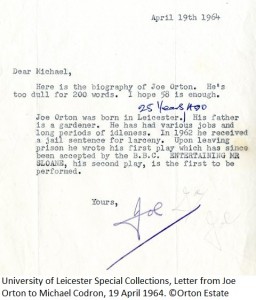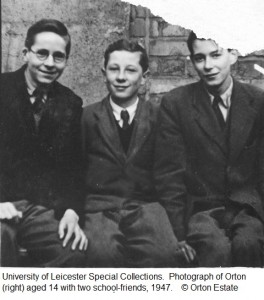Joe Orton’s Entertaining Mr Sloane was first performed at the New Arts Theatre Club 50 years ago today. When he was asked to provide a 200-word biographical note for the programme, he responded: ‘Here is the biography of Joe Orton. He’s too dull for 200 words. I hope 58 is enough,’ and offered the following summary:
‘Joe Orton was born in Leicester 25 years ago. His father is a gardener. He has had various jobs and long periods of idleness. In 1962 he received a jail sentence for larceny. Upon leaving prison he wrote his first play, which has since been accepted by the BBC. Entertaining Mr Sloane, his second play, is the first to be performed.’
The producer, Michael Codron, worried that, although everything in the paragraph was fact, they might be accused of trying to shock the middle classes. However, he observed, ‘One doesn’t need to, the play will do that.’
Orton’s story really doesn’t need any embellishment – it was a remarkable one. He grew up on the Saffron Lane council estate in Leicester, but moved to London at the age of 17, when he won a scholarship to RADA, ‘closing the door on his past’. At RADA he soon met Kenneth Halliwell, a fellow student, seven years his senior. In June 1951, he moved into Halliwell’s NW6 flat. They were to live together as a couple for 16 years. Orton went on to become one of the most notorious authors of the 1960s, known both for his savagely satirical and scandalous black comedies and for his unconventional lifestyle.
As part of the special events to mark the 50th anniversary of Entertaining Mr Sloane, I’ve been lucky enough to work on the exhibition ‘Joe Orton in 1964’, using correspondence, scripts, press cuttings and photographs from the Joe Orton Archive, which was purchased by the University in 1997. I knew that I wanted to use Orton’s own words to describe events wherever I could (why do anything else, when his words stick in the mind so vividly) and, where that was not possible, the words of his contemporaries – and to keep any comments and explanations to a minimum. I deliberately began by studying the relevant material in the archive, rather than by reading the various books published on Orton’s life and work (not even John Lahr’s famous biography Prick Up Your Ears, although of course I’ve referred to it often). It was interesting to see where that approach led me.
1964 was the year that made the working-class boy from Leicester famous. In May, Entertaining Mr Sloane began its successful run in the West End. In June, Orton finished writing The Good and Faithful Servant. The Ruffian on the Stair was aired on the BBC Third Programme in August. Between June and October, he wrote Loot. By the end of the year, he had become a successful playwright, his work praised by many of the critics and by his peers.
You can find the Special Collections display case in the basement of the David Wilson Library. Entry to the library is free but controlled, so if you are not a student or member of University staff, please ask to be let through the barrier. Details of staffed opening hours are available on the Library website. The exhibition runs until 31 August 2014.




 Subscribe to Margaret Maclean's posts
Subscribe to Margaret Maclean's posts
Recent Comments